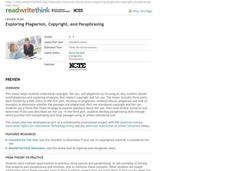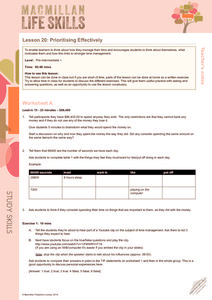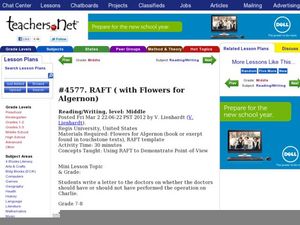Curated OER
Forming Open-Ended Questions
Help readers learn to create their own open-ended questions for any text you are working with. Using Bloom's Taxonomy, learners begin on the lower levels and work their way up to form questions that focus on synthesis instead of simple...
ReadWriteThink
Exploring Plagiarism, Copyright, and Paraphrasing
Plagiarism, copyright, and fair use are the focus of a three-part instructional activity designed to inform scholars of how to properly cite others' work. First, pupils use a KWL chart to begin thinking and discussing plagiarism. They...
Novelinks
The Westing Game: Anticipation Guide
Are all criminals bad people? Pupils answer this and other compelling questions in an anticipation guide for The Westing Game by Ellen Raskin. Designed for learners to complete before reading the text, the...
City University of New York
Women's Suffrage and World War I
Democracy cannot exist where not everyone has equal rights. Discuss the state of democracy and women's suffrage during World War I with class discussions, debates, and primary source analysis, in order for class members to connect with...
Scholastic
Marijuana Facts
Can marijuana really hurt you? Three medical facts and three discussion questions prompt teenagers to consider the ramifications of using marijuana recreationally.
West Virginia Department of Education
Editorials: The Guiding Voice of Authority?
How much can opinion influence a news story? A standalone resource discusses the importance of John Brown's Raid through the lens of journalism. Learners analyze two different texts, one from the perspective of the North and the other of...
California Education Partners
My Five Senses by Aliki
An assessment designed to examine scholars' reading comprehension skills takes place over three days. Starting with a read-aloud of My Five Senses by Aliki, learners then take notes and discuss their most memorable moments with a peer....
Curated OER
Lost on Everest
What would it be like to be stranded on Mount Everest? Curious learners view a video clip, test common fabrics to see how they stand up to cold, and develop/answer discussion questions.
Curated OER
Training Students for Literature Circles
Role sheets clearly define expectations of all group members in this introduction to literature circles. By using a variety of picture books or short texts, readers can practice roles while the teacher circulates to each group observing...
Macmillan Education
Prioritising Effectively
How do you determine the things you must do during your day from those that you want to do, or are willing to put off? Time management and prioritizing effectively are the focus of this life skills lesson, which includes worksheets,...
Novelinks
The Little Prince: Blooms’ Taxonomy Questions
Question what you read with a lesson based on Bloom's Taxonomy. As kids read The Little Prince by Antoine de Saint-Exupéry, they formulate questions with cues from a graphic organizer, and answer them to work on critical thinking skills.
C-SPAN
Debates
How do the presidential debates of 2016 compare to the debates from the 1980's? What about the 1960's? Evaluate a chosen candidate or issue from the 20th and 21st centuries with a lesson plan focused on political debates. Middle and high...
Center for History Education
African Americans and the Democratic Party
Why did African American voters switch from the Republican Party to the Democratic party during the Depression Era? That is the question young historians attempt to answer as they study primary source documents from the period. The focus...
Maryland Department of Education
The Concept of Diversity in World Literature Lesson 12: Author's Purpose - Yeats and Achebe
Is there such a thing as fate/luck? Can one fight destiny? As part of their study of Chinua Achebe's purpose in writing Things Fall Apart, class members answer these questions from Achebe's point of view and then from William Butler...
Gobal Oneness Project
A Tapestry of Multicultural Diversity
New York City is a perfect place to begin a study of multicultural diversity. The largest and the most culturally diverse city in the United States provides the backdrop for a photo essay that features images of cultural and religious...
Peace Corps
Community
What is a community? Find out with a lesson that sheds light onto the different types of communities—school, local, and global. Scholars read informational text detailing the life of a young girl from Cape Verde and take part in a...
EngageNY
When Can We Reverse a Transformation? 2
The second lesson on finding inverse matrices asks class members to look for a pattern in the inverse matrix and test it to see if it works for all matrices. The teacher leads a discussion to refine the process in finding inverses, then...
EngageNY
Selecting a Sample
So what exactly is a random sample? The 15th part in a series of 25 introduces the class to the idea of selecting samples. The teacher leads a discussion about the idea of convenient samples and random samples. Pupils use a random...
University of Pennsylvania
From the Dreyfus Affair to the World Today
Historical events do not occur in a vacuum. Such is the case of the Dreyfus Affair, where the connection between Captain Alfred Dreyfus, Emile Zola, and Hannah Arendt is fused by the events of the early 20th century. The informative...
Teach With Movies
Title: "Pygmalion" - Topics: Drama/England; World/England
“What do you mean that my language is improper?” Prior to My Fair Lady was Pygmalion. Fair Eliza’s struggles with English, which according to George Bernard Shaw “is not accessible even to Englishmen,” come alive in the 1938 film version...
Curated OER
Flowers for Algernon: RAFT
Should Charlie undergo an operation to increase his intelligence? A mini-lesson for a unit on Daniel Keyes novel Flowers for Algernon uses a RAFT activity, which prompts students to write a letter to Charlie's doctors explaining why they...
Curated OER
Pride and Prejudice: Question Answer Relationship Strategy
Help middle and high school readers access the text with a series of question-answer relationship (QAR) strategies. Using Jane Austen's Pride and Prejudice as an example, the resource prompts learners to ask and answer questions using...
Novelinks
Touching Spirit Bear: Question Answer Response Strategy
What types of questions help readers learn the most? Sixth, seventh, and eighth graders learn how to ask four types of questions from the Question Answer Response (QAR) reading strategy to help grow their comprehension of Touching Spirit...
TED-Ed
How Languages Evolve
Do all languages have a common ancestor? Although no one yet knows the answer to that big question, the narrator of this short, animated video explains how linguists use migration patterns, geological features, and word clues to...

























